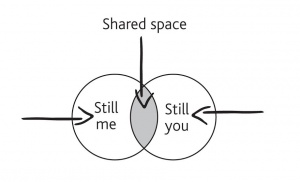When different opinions lead to an argument instead of a conversation, it's because we feel threatened, intimidated or scared by the other person disagreeing with us. We may feel the other person isn't taking us seriously or may even leave the relationship because of our differing opinion. In any case, we find it difficult, if not impossible, to respect the other person's right to their opinion.
At the same time we demand exactly that for ourselves, namely that our opinion is respected if not totally accepted. We not only want to be listened to, we also want the other person to give up their opinion for the benefit of our much more acceptable and reasonable one. This demand may come with attitude - How dare you argue with me! To make matters worse, we then become frustrated when the gratitude we expect in return for helping them change their minds is not forthcoming.
If we stopped taking ourselves so seriously, we could listen better
Here's a different suggestion. What if we treated the other person and their opinion with curiosity and the kind of respect we reserve for people with different backgrounds and experiences? We could then listen without reference to our dissenting opinions. After all, ours is just another opinion. If we stopped taking ourselves so seriously, we could listen better and settle on That's an interesting point of view instead of feeling threatened by it.
Even if the opinion is directed against us, as in 'you're a right royal idiot', you can simply accept it as a captivating point of view, leaving it with the other person and not taking it on board. It may not always be easy, but it's possible if you remind yourself that it's only someone's opinion, to which they are entitled.
You can, of course, buy into the argument; but remember that in doing so you're choosing to allow the other person's opinion to enter your mind. You've started renting out space in your head to them.
In this diagram a relationship is symbolised by the overlap of the two circles, the common space - this signifies the reason we're engaging with this person.

In disagreements we tend to focus more on our own expectations. Instead, appreciating what makes the other person different and unique can be a reminder of why you were attracted to them and therefore, made the effort to discover or create that common space, despite your respective differences. The acknowledgement of these differences is reflected in the respect you show the person.

